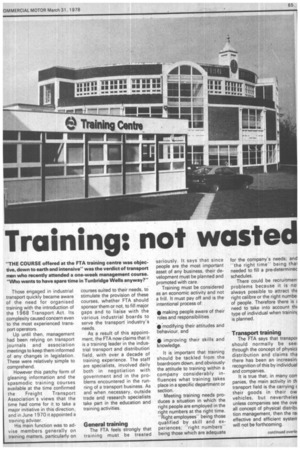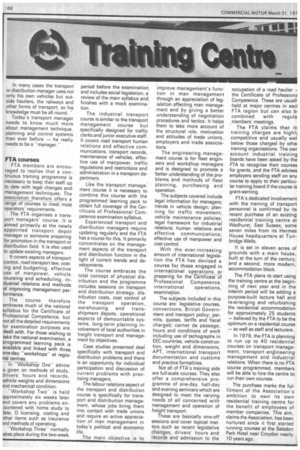Training: not wasted
Page 57

Page 58

If you've noticed an error in this article please click here to report it so we can fix it.
THE COURSE offered at the FTA training centre was objective, down to earth and intensive" was the verdict of transport men who recently attended a one-week management course. "Who wants to have spare time in Tunbridge Wells anyway?"
Those engaged in industrial transport quickly became aware of the need for organised training with the introduction of the 1968 Transport Act. Its complexity caused concern even to the most experienced transport operators.
Up until then, management had been relying on transport journals and association meetings to keep them informed of any changes in legislation. These were relatively simple to cornprehend.
However this patchy form of gleaning information and the spasmodic training courses available at the time confirmed the Freight Transport Association's views that the time had come for it to take a major initiative in this direction, and in June 1970 it appointed a training adviser.
His main function was to advise members generally on training matters, particularly on courses suited to their needs, to stimulate the provision of these courses, whether FTA should sponsor them or not, to fill major gaps and to liaise with the various industrial boards to serve the transport industry's needs.
As a result of this appointment, the FTA now claims that it is a training leader in the industrial transport and distribution' field, with over a decade of training experience. The staff are specialists, involved daily both in negotiation with government and in the problems encountered in the running of a transport business. As and when necessary, outside trade and research specialists take part in the education and training activities.
General training
The FTA feels strongly that training must be treated seriously. It says that since people are the most important asset of any business, their development must be planned and promoted with care.
Training must be considered as an economic activity and not a frill. It must pay off and is the intentional process of: • making people aware of their roles and responsibilities , • modifying their attitudes and behaviour, and • improving their skills and knowledge.
It is important that training should be tackled from the boardroom down, and obviously. the attitude to training within a company considerably influences what training takes place in a specific department or section.
Meeting training needs produces a situation in which the right people are employed in the right numbers at the right time. "Right employees" being those qualified by skill and experiences; "right numbers" being those which are adequate
for the company's needs; and —the right time" being thai needed to fill a pre-determinec schedules.
There could be recruitment problems because it is no' always possible to attract thE right calibre or the right num be of people. Therefore there is E need to take into account tht type of individual when traininc is planned.
Transport training
The FTA says that transpor should normally be seei through the concept of physics distribution and claims tha there has been an increasini recognition of this by individual and companies.
It is true that, in many conpanies, the main activity in th transport field is the carrying their goods in their ow vehicles, but nevertheles unless companies see the ove all concept of physical distribt tion management, then the re; effective and efficient systerr will not be forthcoming.
In many cases the transport or distribution manager uses not only his own vehicles but outside hauliers, the railways and other forms of transport, so his knowledge must be all round.
Today's transport manager needs to know much more about management technique, planning and control systems than ever before —. he really needs to be a ''manager."
FTA courses
FTA members are encouraged to realise that a continuous training programme is necessary to keep their staff up to date with legal changes and management techniques. The association therefore offers a range of courses to meet most operators' requirements.
The FTA organises a transport managers' course. It is , aimed primarily at the newly appointed transport depot manager or someone preparing for promotion in the transport or distribution field. It is also used to update existing managers.
It covers aspects of transport control, road transport law, costing and budgeting, effective use of manpower, vehicle routeing and scheduling, industrial relations and methods of improving management performance.
The course therefore embraces much of the national syllabus for the Certificate of Professional Competence, but not all the detailed requirements for examination purposes are dealt with. For those wishing to take the national examination, a
programmed learning pack is available and linked with three, one-day "workshops" at regional centres.
In "Workshop Oneadvice is given on methods of study, drivers' hours and records, vehicle weights and dimensions 3n d mechanical condition.
"Workshop Two" is held approximately six weeks later 3nd covers any problems enountered with home study to date, 0 licensing, costing and 3ther items such as insurance 3nd methods of operating.
"Workshop Three" normally akes place during the two-week period before the examination, and includes social legislation, a review of the main syllabus and; finishes with a mock examina-• lion.
The industrial transport course is similar to the transport management course but specifically designed for traffic clerks and junior executive staff. It covers road transport human relations and effective communications, transport records, maintenance of vehicles, effective use of manpower, traffic regulations and restrictions and administration in a transport department.
Like the transport management course it is necessary to combine this course with the programmed learning pack to obtain full coverage of the Certificate of Professional Competence examination syllabus.
Experienced transport and distribution managers require updating regularly and the FTA has a course for this. It primarily concentrates on the management aspects of the transport, and distribution function in the light of current trends and developments.
The course embraces the total concept of physical distribution and the programme includes sessions on transport and distribution strategy, distribution costs, cost control of the transport operation, warehousing and transshipment depots, operational aspects of demountable systems, long-term planning involvement of local authorities in freight transport and management by objectives.
Case studies presented deal specifically with transport and distribution problems and there is an opportunity for individual participation and discussion of current problems with practising managers.
The labour relations aspect of the transport and distribution course is specifically for transport and distribution management, whose jobs .bring them into contact with trade unions and require an active appreciation • of man management in today's political and economic life.
The main objective is to Improve management's function in man management through an appreciation of legislation affecting man management and by giving a better understanding of negotiation procedures and tactics. It helps them to take more account of the structural role, motivation and attitudes of trade unions, employers and trade associations.
The engineering management course is for fleet engineers and workshop managers and is designed to promote a 'better understanding of the problems and methods of fleet planning, purchasing and operation.
The subjects covered include legal information for managers; trends in vehicle design; planning for traffic movement. vehicle maintenance policies; legal framework for industrial relations; human relations and effective communications; effective use of manpower and cost control.
With the ever-increasing amount of international legislation the FTA has devised a course for, those engaged in international operations or ,preparing for the Certificate of Professional Competence, international operations, examination.
The subjects included in this course are: legislative courses, conventions, British Government and transport policy; permits, quotas, tariffs and fiscal charges; carnet de passage, hours and conditions of work including use of tachographs in EEC countries, vehicle construction, weight and dimensions, APT, international transport documentation and customs and practice formalities.
Not all of FTA's training aids are full-scale courses. They also offer a comprehensive programme of one-day, half-day and evening seminars which are designed to meet the varying needs of all concerned with management and operation of freight transport.
These are basically one-off sessions and cover topical matters such as recent legislative changes, drivers' hours and records and admission to the
occupation of a road haulier the Certificate of Professions Competence. These are usuaft held at major centres in eacl FTA region but can also b, combined with regula members' meetings.
The FTA claims that it training charges are highl) competitive and usually wel below those charged by °the training organisations. The owr account industrial training boards have been asked by the FTA to recognise their courses for grants, and the FTA advises employers sending staff on any course to apply to their particular training board if the course is grant-earning.
ETA's dedicated involvement with the training of transport personnel is confirmed by its recent purchase of an existing residential training centre at Wadhurst, East Sussex, some seven miles from its Hermes House headquarters at Tunbridge Wells.
It is set in eleven acres of grounds with a main house, built at the turn of the century, and a second, more modern, accommodation block.
The FTA plans to start using the training centre at the beginning of next year and in the interim period will be adding a purpose-built lecture hall and re-arranging and refurbishing the residential accommodation for approximately 25 students — believed by the FTA to be the optimum on a residential course — as well as staff and lecturers.
In 1979, the FTA is planning to run up to 40 residential courses on transport management, transport engineering management and industrial relations. When there is no FTA course programmed, members. will be able to hire the centre to run their own courses.
The purchase marks the fulfilment of the Association's ambition to own its own residential training centre for the benefit of employees of member companies. This aim, claims the Association, has been nurtured since it first started running courses at the Selsdon Park Hotel near Croydon nearly 10 years ago.






















































































































